Program: #97-14 Air Date: Apr 07, 1997
NOTE: We were joined in this program by Fr. Jerome Weber, early music critic for Fanfare magazine. Many of these recordings were out-of-print when the program was aired.
This program is Free for all, thanks to this generous Preservation Grant:
I. Johannes Ockeghem: Missa Caput (Capella Cordina/Alejandro Planchart). Lyrichord LLST 7213.
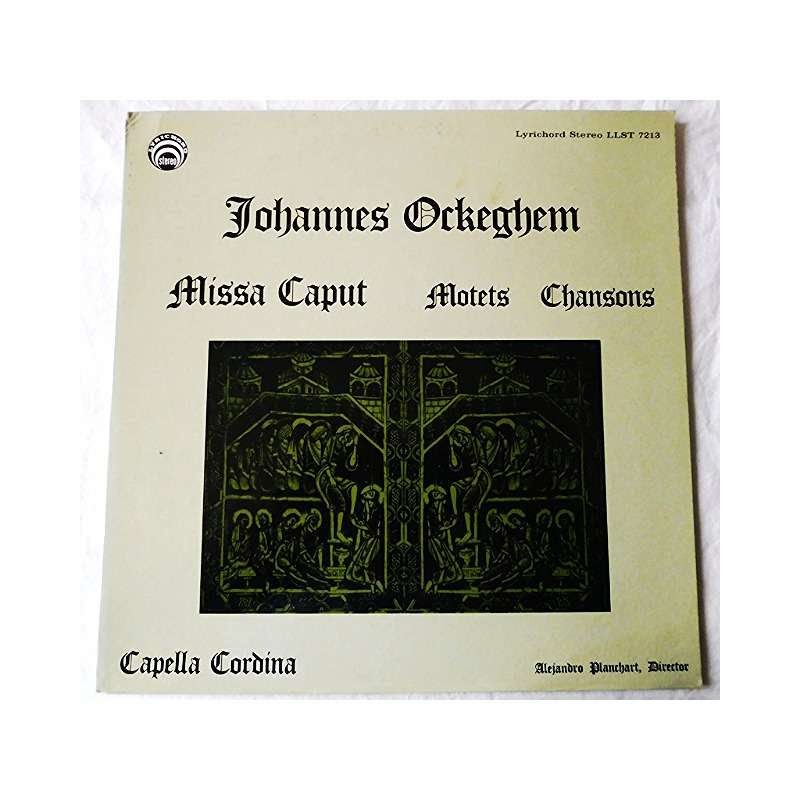
In 2013 he was awarded the medal of the city of Tours (Loire) and the Centre d’Etudes Superieurs de la Renaissance, for his work in the performance and history of French music of the Renaissance.
II. Johannes Ockeghem: Missa ma Maitresse Missa Au travail suis (Pomerium Musices/Alexander Blachly). Nonesuch H-71336
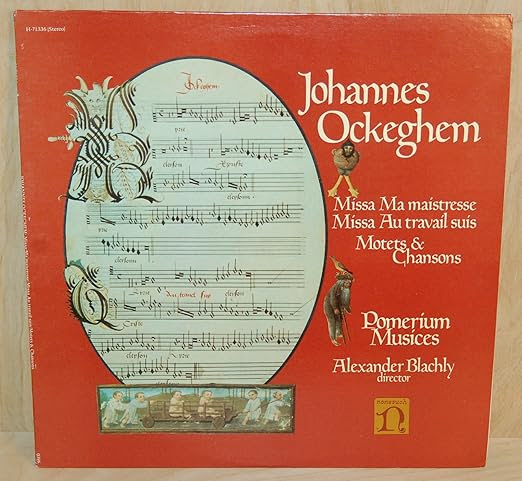
The older music floats in an orbit all its own. For no matter how often we encounter the early Renaissance today, it behaves strangely to ears enriched (or perhaps infected) by the abrupt homeward pull of the dominant seventh chord. The harmonic resolutions of Busnoys and Ockeghem are rounder; they touch ground more lightly. Listening to them is, for a contemporary earthling, like negotiating the gravity of the moon.
Ockeghem, Busnoys's friend and possibly his teacher, was used here as a means of comparison. His "Alma redemptoris mater" began the afternoon; his "Ave Maria" was sung after intermission. The Busnoys items included two masses, "Anthoni usque limina," "In hydraulis" (a tribute to Ockeghem) and the "Victime pascali."
Alexander Blachly, who conducted this beautifully groomed chorus of 13 voices and also wrote the the program note, sees in the two men's mutual respect a 15th-century version of Haydn and Mozart. Mr. Blachly does not say which is which, but it is interesting to stretch the comparison a little beyond his original intentions. Ockeghem would be my Mozart, for his love of dark colors, for the continuous exposition of new musical ideas and for a body of music that instead of accumulating weight through imitation and repetition, moves with sinuous horizontal flow.
Busnoys's upper-register brilliance is possibly Haydnesque, but the overt, calculated drama is certainly not. "Anthoni usque limina" is punctuated by a chiming, repeating vocal expletive; one imitative phrase piles upon the other. In the "Missa O crux lignum triumphale," held notes are suspended prominently across the intertwining contrapuntal textures. The Creed becomes, in Mr. Blachly's interpretation at least, a powerful crescendo of faith. Its tactics are almost flamboyant. In these pieces, Pomerium Musices stresses clarity and intonation over radiant choral sound. The timbres appear in primary colors. Seduction gives way to rational persuasion.
| A1 | Motet: Ave Maria | 3:13 |
| A2 | Antiphon: Alma Redemptoris | 4:18 |
| A3 | Bergerette: Ma Maistresse | 6:04 |
| A4 | Missa Ma Maistresse | 8:08 |
| B1 | Rondeau: Au Travail Suis | 4:44 |
| B2 | Missa Au Travail Suis | 20:11 |
III. Ockeghem: The Motets (Cappella Nova/Richard Taruskin). Musical Heritage Society 4179.
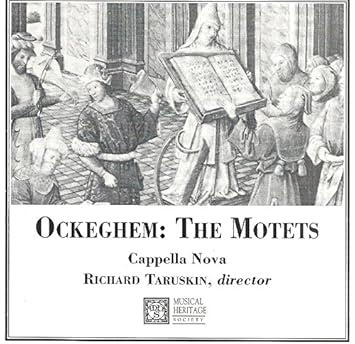
-
- Motet: In hydraulis
Johannes Ockeghem:
- Motet: Alma Redemptoris
- Motet: Intemerata Dei
- Motet: Salve Regina I
- Motet: Salve Regina II
- Motet: Ave Maria
- Motet: Caeleste beneficium
- Motet: Gaude Maria
IV. Johannes Ockeghem: The Motets to the Virgin (Prague Madrigal Singers/Miroslav Venhoda). Musical Heritage Society 1306.
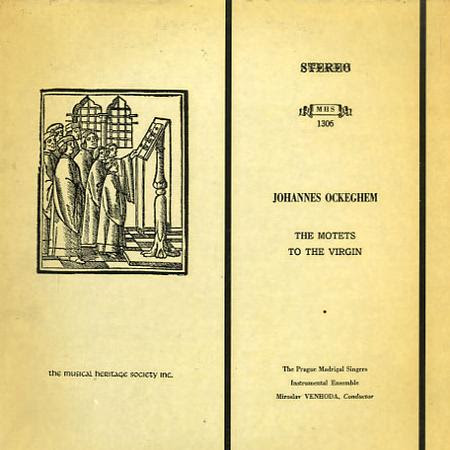
| Salve Regina I (4:46) -- Intemerata Dei mater (5:26) -- Gaude Maria virgo (10:06) -- Alma Redemptoris mater (4:05) -- Ave Maria (2:28) -- Salve Regina II (7:28) -- Instrumental motet: Ut heremita solus (8:21). |
V. & VII. Musiciens à la Cour de Bourgogne (Ensemble Guillaume de Machaut/Guy Robert). Disques Alvarez 811.
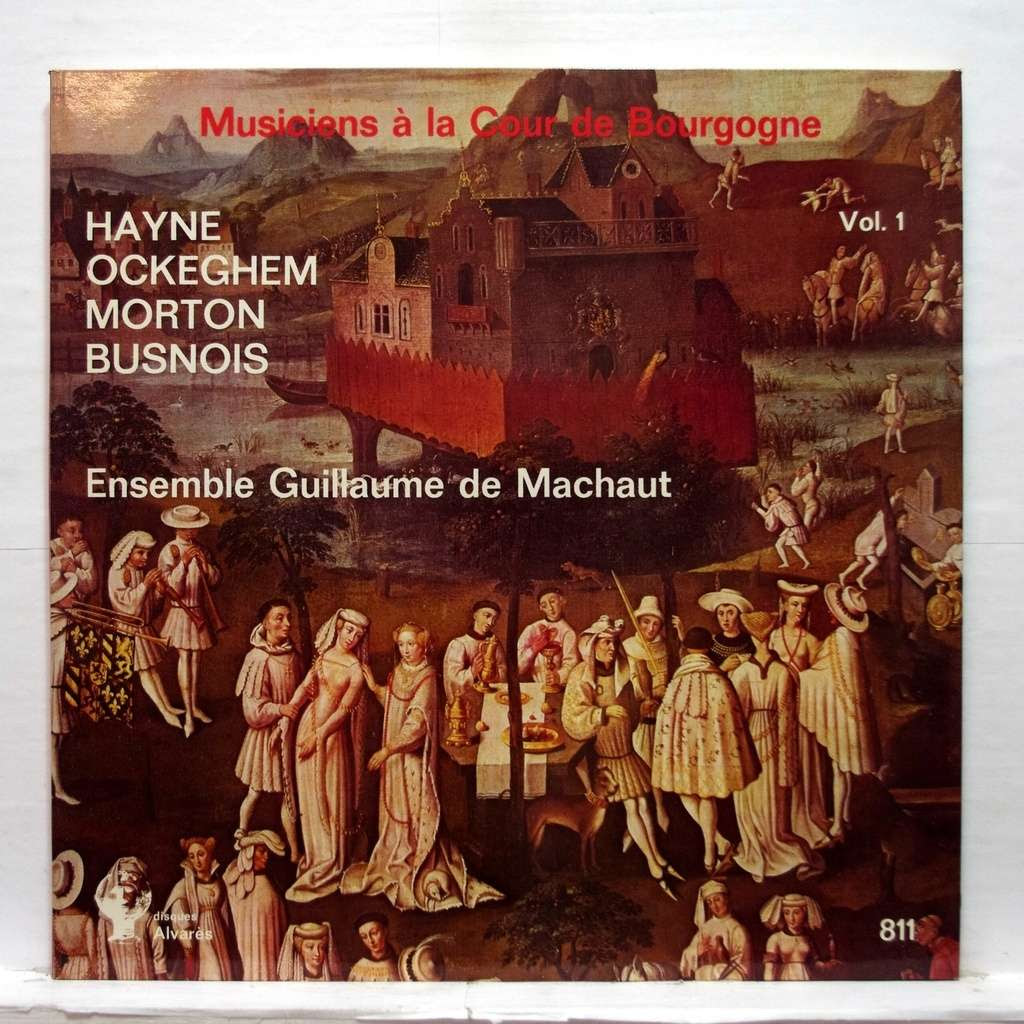
| De Tous Biens Playne | |
| Basse Danse | 1:14 |
| Chanson | 2:43 |
| Canon A La Minime De Josquin Des Près | 1:13 |
| Deux Contrepoints De Agricola | 1:17 |
| Déploration Sur La Mort De Binchois | 5:00 |
| La Spagna | 1:35 |
| Ma Maîtresse | 4:27 |
| Pour Ce Que J'ay Jouy | 3:25 |
| Amors, Amors | 5:36 |
| Le Souvenir | 2:32 |
| Fortuna | 3:00 |
| Morton Et Haynes | 3:00 |
| Spagna | 1:26 |
| Je Ne Fay Plus | 4:05 |
| Cousine | 2:32 |
VI. Okeghem (sic): Three Motets (ensemble/Roger Blanchard). Originally, Club Français du Disque, reissued as Music Guild MS-134.
:format(jpeg):mode_rgb():quality(90)/discogs-images/R-10758492-1503786657-9799.jpeg.jpg)
| A1 | Prenez Sur Moi Votre Exemple | |
| Intemerata Dei Mater | ||
| A2 | Intemerata | |
| A3 | Nec Sine Te Manet | |
| A4 | Aspiciat Facito | |
| A5 | Ut Heremita Solus | |
| Missa "Hercules Dux Ferrariae" (D'este) | ||
| B1 | Kyrie | |
| B2 | Gloria | |
| B3 | Credo | |
| B4 | Sanctus | |
| B5 | Benedictus | |
| B6 | Agnus Dei |
VIII. Johannes Ockeghem: Missa pro defunctis (Pro Cantione Antiqua/Bruno Turner). Archiv 2533.146 (NOTE: was reissued as a CD).
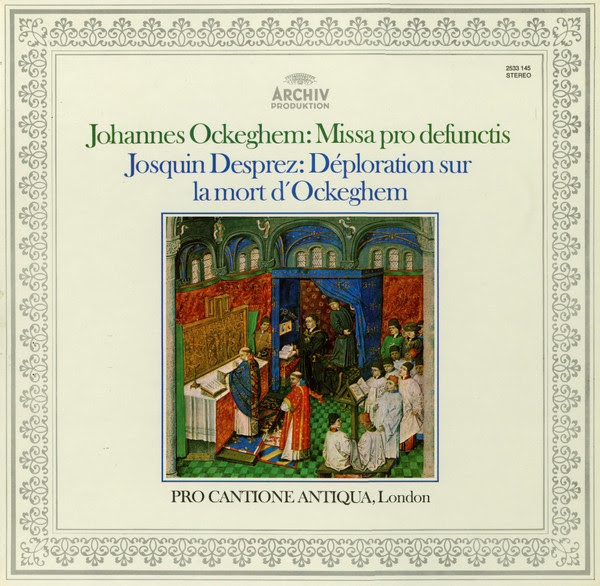:format(jpeg):mode_rgb():quality(90)/discogs-images/R-2790163-1542398429-3318.jpeg.jpg)
The Josquin is surely among the finest recorded performances Pro Cantione Antiqua have ever made. Everything is lucid, sung with energy and passion but without interfering with the music, which is allowed to unfold miraculously. Their performance of the Ockeghem Requiem, on the other hand, never satisfied me in the past: there was something about the thickness of the vocal and instrumental sound that made it soporific. But it is astonishing what the transfer has achieved in making that sound more transparent; and a slight new emphasis on the higher partials seems to me to make the whole performance infinitely more persuasive. It should be mentioned that most of the Ockeghem is doubled by with wind players of the Hamburger Blaserkreis fur alte Musik; but once again in the transfer their effect seems more to enhance the sound.
For some reason the original sleeve-notes by Bruno Turner and Jeremy Noble—who edited the works for the recordings—have now been replaced by entirely new material. But there is plenty of reading matter here; and full texts are included.’
|
Composed By – Johannes Ockeghem |
|
||
|
A1 |
– |
Introitus |
6:08 |
|
A2 |
– |
Kyrie |
6:24 |
|
A3 |
– |
Graduale |
6:46 |
|
B1 |
– |
Tractus |
8:04 |
|
B2 |
– |
Offertorium |
8:08 |
|
B3 |
Composed By – Josquin Desprez Words By – Jean Molinet |
Composer Info
Johannes Ockeghem, Antoine Busnois, Josquin Desprez
CD Info
Lyrichord LLST 7213, Nonesuch H-71336, Musical Heritage Society 4179, Musical Heritage Society 1306, Disques Alvarez 811, Music Guild MS-134, Archiv 2533.146